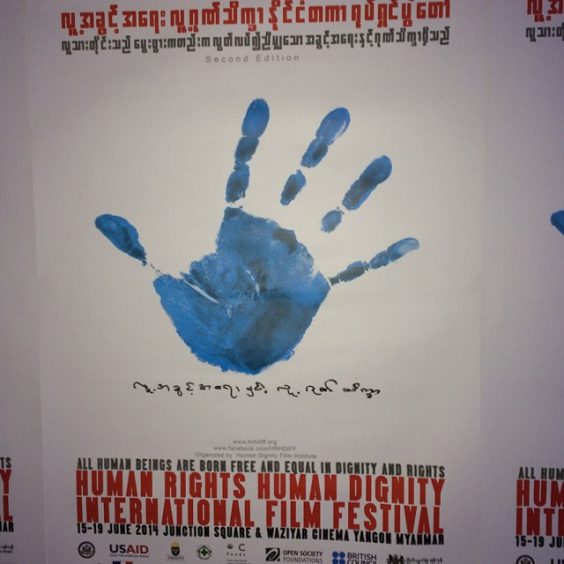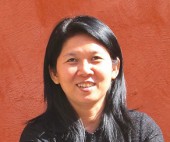Transparency is the Best Propaganda for Burma’s New Government
by Ma Thida / July 1, 2016 / No comments

The Human Rights and Human Dignity film festival took place in June 2016. Image via Flickr user: Benjamin Lee.
Despite recommendations for reform, Burma’s state-run media has yet to embrace freedom of expression.
A new generation editor throws a daily state-owned newspaper onto the table. “Well, this is ridiculous. My discussion was censored here. What an old practice! Censorship!” On May 15, 2016, Mizzima media and Actionaid, organized a policy dialogue on media development. Many journalists expressed their thoughts on state media and the existence of the Ministry of Information (MOI). The majority of journalists do not support the existence of MOI considering many of its publications have not been in-line with freedom of expression, but agree it should only be dissolved after helping the amendment of laws which were established during the last parliament or under military dictatorship. The response from the minister on this issue was not as many journalists expected. In the past, he was among those who did not agree to maintain the Ministry of Information under democratic government. Now, however, he says that government has an important function to raise awareness and educate its people. He also mentioned, “It is also important to hear the voice of the people and of those who don’t necessarily agree with the government. This allows for different perspectives to be heard. People will be more able to make informed choices through sharing different views.” Yet on May 16, 2016, The Mirror, a state newspaper, did not publish any discussions against the concept of keeping both the Ministry of Information and state media.

- Literature is an echoing voice of people’s thought. Along with its people, Burma’s literature and media have suffered greatly during five decades of censorship. The majority of Burma’s population are voiceless, and many untold stories are yet to be discovered by local or international writers and journalists. Here, let’s try to find out and listen to what problems people are feeling, thinking, and facing regarding freedom of expression in their everyday lives in Burma.

- Ma Thida is a Burmese human rights activist, writer, medical doctor, and former prisoner of consciousness. In 1993, she was sentenced to twenty years in Burma’s Insein Prison for actively supporting the Nobel laureate Aung San Suu Kyi. She served six years of her sentence, largely in solitary confinement, and was released through the efforts of Amnesty International and PEN International. She has published nine books in Burmese and English, including The Sunflower (1999), The Roadmap (2011), and Sanchaung, Insein, Harvard (2012), a memoir. Ma Thida is currently president of PEN Myanmar.
Indeed after five decades of dictatorship, people’s perspectives towards state and government, media and public relations, and censorship and editing have become muddled. The majority of Burmese citizens still believe government belongs to the state; therefore since they are not government officials, they are not part of the state. Under dictatorial rule, the state had been totally monopolized by (military) governments. Similarly, since all military governments use the Ministry of Information and state media as machines of propaganda, people cannot even think of using the public relations and information departments to inform its people. Instead of having a public relations department for every ministry of government, the military government uses the Ministry of Information for both censorship of publications and propaganda itself. Therefore the Myanmar charter of PEN International (PEN Myanmar), which was founded in late 2013, recently published its resolution under new government on this year’s World Press Freedom Day. It stated, “The Ministry of Information should assist the different ministries to establish well-functioning public relations departments to release immediate news of public interest. PEN Myanmar believes that once the public relations departments will have started operating efficiently, a plan to abolish the Ministry of Information is necessary in a democratic country.”
Since there has been a very long military dictatorship, not only government bodies but also the military owns private media. For example, the military owns the Myawady TV channel, a daily newspaper and also a radio station. Under military dictatorship, both state-owned print and broadcasting media and the military’s private media provided more or less the same presentation and information. Now the new government mainly consists of civilians. Therefore content and presentation of state-owned and military-owned media has become a bit different, but not much better than those under the last government. For example, state newspapers cover progress of the peace process, but those can’t explain much about key differences between the last and current government, like preparation of the national conference, reframing the dialogue framework, and decisions on participants, especially from civil society organizations. On top of this, the military’s private media still uses the term “insurgents” for ethnic armed forces while state-media is now trying not to use it since many civil society organizations and private independent media are trying to avoid conflict-sensitive terms and usages. Therefore the general public still does not know what the new government’s basic principle for national reconciliation is.
Recently at least one officer from every ministry, including the state army, was announced as a spokesperson. However most of their contact emails and phone numbers rarely work. Plus, the general reply from the military is that reporters should ask the Myanmar Press Council (MPC) first. In fact the setting of MPC itself is pretty undemocratic since it includes assigned persons from the president, speakers of the upper and lower houses plus selected nominees suggested by journalists. Plus the election process is just among the selected board members assigned to choose the president and deputy of the MPC. Since most of the board members of MPC do not have mandates from journalists, its influence on them is in dilemma. The formation of MPC was legally bonded under mother law and by law of News Media Law 2014. A lot of journalists were against it. PEN International, PEN Myanmar and Myanmar ICT for Development Organization MIDO submitted their UPR reports and recommendations in the last UPR session.
In March of 2016, the last government accepted eight recommendations related to improving Freedom of Expression and five recommendations to amend or repeal the News Media law and the Publishing and Printing Enterprise Law. However the way the Ministry of Information is doing its activities has not yet changed, even in its state newspapers. Although the minister of MOI promised to change those into people-oriented media during the 100 days honeymoon period plan, state newspapers are still being used as state propaganda today. The general public still needs to rely on some in-depth information from private-run independent newspapers and journals. News about the deaths of dozens of workers by a landslide struck in Kachin state, conflict based on land grabbing in Mandalay division, and other regional news couldn’t be covered enough in state media although it publishes about a state counsellor’s eye operations at state-owned hospitals. Therefore PEN Myanmar stated that public bodies should not be allowed to establish and use their own media and additionally, current media owned by those public bodies should be immediately privatized.
On June 14, 2016, the 4th Human Rights and Human Dignity film festival launched and the film for the opening ceremony was banned to be screened by the Film Classification Board, which is under the Ministry of Information. The film, Twilight over Burma, is based on a true story of the Shan princess, Inge Sargent, and her husband, Sao Kya Seng. Their love was disturbed by the mystery disappearance of Seng soon after the military dictator, Ne Win, took power in 1962. The film is based on the autobiography, Twilight over Burma: My Life as a Shan Princess, written by Sargent herself, which has been translated into Burmese by two writers already. Consequently the story is quite well-known among readers, but not much among laymen. The decision not to show the film at all at the festival severely destroyed the image of the new government, especially the Ministry of Information. Festival director Mon Mon Myat said in her opening remarks that the festival is not just simply the festival but it also reflects the current situation of human rights in Burma, which is obviously still deprived. Censorship is a very old weapon of the military government and still very useful for the new government. The excuse sounds like there is no more blame on the old dictator or military. However until and unless we dare to face the truth, reconciliation among the ethnic population could be achieved. According to many informal sources, the decision from the minister to censor board was “to rescreen again before the final decision.” However it was complicated and was never clear about who has true authority for decisions. In the monthly magazine, Frontier Myanmar, the details were explained, and it sounds like the minister intervened in the decision although he never admitted it.
After more than five decades of dictatorship, people are hungry for information, especially from the government. Only with informed census of the general public could the government gain full public participation and co-operation. Therefore they need to be informed about almost everything regarding the government: its policy, plan, preparation, and progress or problems. That’s why transparency is not only key but also the best propaganda to any democratic government. What we do need is neither the Ministry of Information nor state or military owned news outlets, but of course, transparency. Laws like the Right to Information Law and the Freedom of Information Act are keys to having transparency and winning informed census from the general public. Thus all the new government needs is transparency for its best propaganda.




